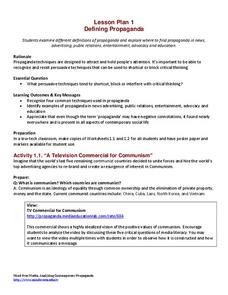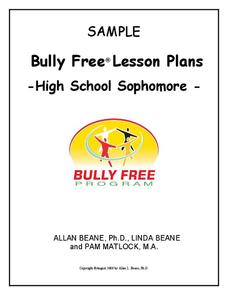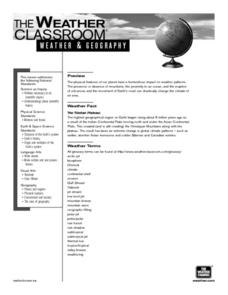Penn Museum
Egypt
From pharaohs and pyramids to the mummification process, this packet is a fantastic resource for studying ancient Egypt! Worksheets not only review key terms and practices that are foundational to ancient Egyptian culture, such as...
Roy Rosenzweig Center for History and New Media
Slaves and Indentured Servants
In theory, at least, indentured servitude and slavery were two different practices in the American colonies. Class groups conduct a close reading of two primary source documents, one written by a slave and one by an indentured servant,...
Global Oneness Project
Deconstructing Consumerism
To increase awareness and launch a discussion of consumerism, class members view What Would It Look Like, a 25 minute film of images that capture the global effects of the consumption of goods. Viewers make a list of the images that they...
Media Education Lab
Defining Propaganda
21st century learners live in a media world. Help them develop the skills they need to be able to analyze the barrage of propaganda they face daily, with a resource that introduces them to the type of persuasive appeals found in news,...
Bully Free Systems
Bully Free Lesson Plans—10th Grade
Two lessons, "What Does Cyber Bullying Look Like?" and "Factors Influencing My Reporting the Bullying of Others," serve as examples of the 12 included in a Bully Free curriculum. Each plan includes discussion questions, an activity, and...
Bully Free Systems
Bully Free Lesson Plans—11th Grade
It takes courage to stand up to bullies. Two sample lessons from a complete Bully Free curriculum, "Courageous and Brave Bystanders" and "Assertiveness Skills for Bullied Students and Empowered Bystanders" provide participants with...
John F. Kennedy Presidential Library & Museum
Ask Not What Your Country Can Do for You
Ask not what the instructional activity here can do for you, but what you can do with the instructional activity. The answer is quite a lot! Young scholars revisit JFK's famous inaugural address with a focus on his plea for civic...
Channel Islands Film
Human Impact on the Food Web of Santa Cruz Island
What happens when a non-native species is introduced onto an island? Santa Cruz Island, part of the Channel Island chain located off the coast of southern California, provides the perfect laboratory for young environmental scientists to...
University of California
The Civil War: Final Assessment
Pupils discover the true nature and purpose of the Civil War in the eighth and final installment of an informative series. Using primary and secondary documents, history buffs merge social study knowledge with English skills to create a...
Social Media Toolbox
Social Media Survey
Survey says ... social media is here to stay! How do the pupils in your school use social media? Using lesson four from a 16-part series, The Social Media Toolbox, learners study surveys and create their own. The resource includes...
Equality and Human Rights Commission
Equality
Despite passing the Equality Act in 2010 covering many groups, gender inequality in Great Britain remains. Scholars investigate the concept of equality with a presentation, discussion, and hands-on timeline activities. The seventh lesson...
EngageNY
Analyzing the Features of a Newspaper Article
There's more to newspaper articles than meets the eye. Scholars learn the different features of a newspaper article, including headline, byline, subheadings, etc. Pupils circle the features in an article as the teacher discusses their...
National Endowment for the Humanities
Lesson 1: On the Road with Marco Polo: A Boy in 13th Century Venice
Learners investigate Marco Polo's life as a young boy in 13th century Venice. They analyze maps, explore various websites, complete a chart and answer discussion questions, and create a travel brochure about visiting 13th century Venice.
Curated OER
Sodbusters!
Learners study American settlers, how and where they lived by observing images. They investigate how the settlers used sod to build houses that were adaptable to the plains environment. They compare living in a sod homes with their home.
Curated OER
Using Effective, Evocative Writing as a Model
Students study an author's style to strengthen their own writing. They read an author's account of the resiliency of the Malian people and about their culture. They examine her focus on Malian women.
Curated OER
The Tibetan Plateau
Students discuss the characteristics of the biosphere, with a focus on the Tibetan Plateau. They participate in a question and answer period discussing biomes and climate patterns. They compare and contrast different ecosystems.
Curated OER
Defining Character, With Help from History
In a single, soundly-designed class period, high schoolers define good character, think-pair-share about thought-provoking quotes on character (More options would enhance the discussion, worth searching online for other quotes to add.),...
University of Arkansas
Promises Denied
"Promises Denied," the second instructional activity in a unit that asks learners to consider the responsibilities individuals have to uphold human rights, looks at documents that illustrate the difficulty the US has had trying to live...
Curated OER
The High Cost of Chemical Dependency
Sixth graders explore, analyze and study the effect and impact that humans have on the environment based on their choices as individuals, businesses and governments. They assess the balance between human activities and aquatic pollution.
Curated OER
Does Rick Warren Represent Diversity?
The topic of this lesson focuses on whether or not Obama was able to convincingly defend his choice of choosing Rick Warren to deliver the invocation at his inauguration. This is considered a controversial or hot topic because it...
Curated OER
Photography and the National Park Service
During the 1800s the United States was expanding westward; land was there for the taking. Kids explore how some early photographers used their photography to influenced the US Congress to save areas like Mirror Lake. They complete a...
Facing History and Ourselves
Kristallnacht: Decision-Making in Times of Injustice
Have you ever been singled out in a crowd before? Pupils investigate and analyze the events of the Holocaust. They dive into the life of a middle school student, as well as the diary entries of those in Kristallnacht during World War II.
Curated OER
Lesson: Looking Closer: The Artwork of Shinique Smith
A critical discussion regarding the nature of Shinique Smith's second-hand clothing art is the foundation for the lesson. Critical thinkers fully analyze the meaning behind her work, taking close consideration of where the clothing came...
Curated OER
Calculating the Cost of Living
Bring Consumer Mathematics and Economics to life with this lesson, where learners investigate personal finance and budgeting. They use the newspaper’s classified section to determine a future job and potential earnings and determine a...
Other popular searches
- Life Skills Worksheet
- Life Skills Math
- Life Skills Lesson Plans
- Real Life Skills
- Math in Daily Life
- Special Education Life Skills
- Basic Life Skills
- Life Skills Lessons
- Nutrition Life Skills
- Plantation Daily Life
- Life Skills Lesson Money
- Computer Budget Life Skills

























